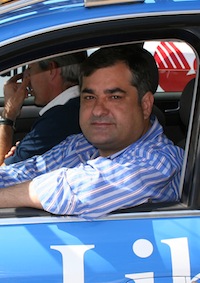“[T]hey wouldn’t even do that to a criminal. None of what they did was legal”
-Alejandro Valverde
It’s tough to imagine a doping scandal more fraught with irony than Operacion Puerto. Even before it had a name, the fantastic contradictions were there; Dr. Eufemiano Fuentes ran a doping ring where he saw his job as ensuring “that riders could put up with the physical demands being made of them”, but a client alleging his health had been ruined by the treatments was what finally blew the lid.
Two years later, when the scandal finally broke, the investigation proved itself an embarrassment to nearly everyone involved—Fuentes, who could have better concealed his clients’ names with a cereal box decoder ring; the Guardia Civil, who revealed their investigative skills outstripped in ineptitude only by their inability to prevent leaks; the riders themselves, caught red-handed; and the Spanish courts and anti-doping officials, for being unable to drive home a slam-dunk case.

Most embarrassed of all were the ASO, organizers of the Tour de France, who now had to host a race where everyone even remotely considered a favorite had run on the front page of every sport daily from Lisbon to Kiev in a photo collage of blood bags and syringes.
The Tour’s response to Operacion Puerto was blunt and idiotic: cajole any TdF teams with riders implicated in the scandal to voluntarily withdraw them before the race. I’ve scattered ample pixels already on the inequity of this—let’s just say I found it wonderfully poetic when Floyd Landis’ late-race urine sample came up positive a few days after the Tour finish, giving the ASO the very “Tour Winner Was Actually On Drugs” headlines their pre-race purges had been conducted to avoid.
Strangely enough, Valverde could have saved the Tour organization from this embarrassment. While no one can say for certain what would have happend if the Spaniard hadn’t broken his collarbone in a mundane crash on Stage 3, Valverde had long gotten the better of Landis in the mountains, and his 5th place finish in the dead flat ’06 prologue was as brilliant as it was suspicious. It’s the opinion of this humble commentator that the 2006 Tour was Valverde’s race to lose.
Still, I hesitate to call Valverde’s crash “bad luck”. While Puerto left entire teams fluttering in the wind, Valverde healed up and battled gamely for the Vuelta title—holding the leaders jersey and taking a stage win in the process—before making the podium at the World Championships later that year. Puerto fallout continued into 2007, as investigations pinned Ullrich to hijo rudico and retirement, while Basso, accorded no other option by investigations in Italy, made the ludicrous claim that he didn’t inhale—but Valverde kept right on riding.
In fact, from the day some Spanish cop found a bag labelled “val.(piti)” to 2009, Valverde’s right-to-ride encountered only one major challenge: the Germans attempting to keep him from riding at the ’07 Worlds in Stuttgart, a prohibition summarily overturned by the CAS. When you’re riding dirty, it sure doesn’t hurt to have your national cycling federation, and indeed, your country’s entire judicial system willing to bend the rules on your behalf
For all of McQuaid’s flack about “mafia nations” it was the Italians who finally clipped Valverde’s wings, matching DNA taken from a rest day sample at the 2008 Tour to DNA in the EPO-laced Bag 18 seized at Operation Puerto. After another year of trial and appeal, the CAS concurred with the Italians, and slapped a two year ban on Valverde, backdated to the beginning of 2010.
To recap: Valverde, for a bag of blood that showed he’d been cheating in 2006, got 18 months off racing, a few results scratched from the records books, and four years of otherwise unencumbered competition, during which he amassed palmares including—but hardly limited to—a Vuelta, a Liege-Bastogne-Liege, a San Sebastien, and two Tour stages. And somehow, this is his idea of rough justice.
There have been a few interesting reactions to Valverde’s unrepentant stance. Joe Lindsey respects the blunt, twisted honesty of it, while @inrng sees holding the Armstrong line as a media management mistake and a bad example. But for me, the biggest problem of Valverde’s response is the delusional excoriation of the very system whose assumptions of innocence let him continue to ride.
Valverde’s sanction wasn’t the result of nefarious forces arrayed against him—it was the product of being extended the benefit of every doubt available. For anyone who missed Tyler Hamilton’s appearance on 60 Minutes, Valverde’s continued sense of persecution might be the best example of the insidious self-deception that is so often the byproduct of an artificially high hematocrit.
Nice piece. I especially like the closing sentence.
Good to see your back on the horse…
Nailed it! My thoughts exactly but expressed much better than I could have written them. The Green Bullet should face some serious targeted testing – just to further his persecution complex a bit more! Meanwhile, will the Puerto mess EVER be fully exposed with all the cheater’s named? It seems Spanish cycling is finally reaping what they’ve sown with their corrupt federation (helped by the economic crisis) so maybe they have nothing left to lose?
Nice piece. Your best effort in the last year or so (take from that what you will…)
@Lebleweg Your meanings—both of them—are well-taken.